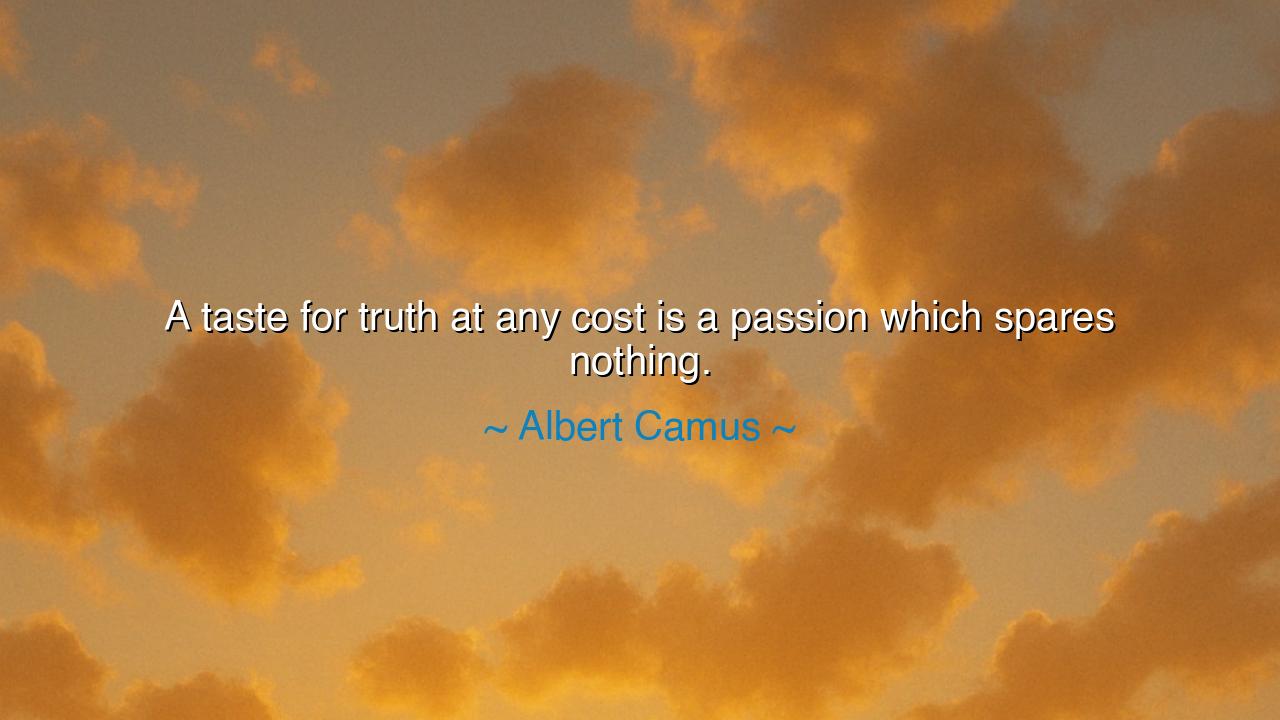
A taste for truth at any cost is a passion which spares nothing.






The philosopher of the Absurd, Albert Camus, once spoke with fire and clarity: “A taste for truth at any cost is a passion which spares nothing.” These words rise from the furnace of his life, lived in the shadow of war, oppression, and the search for meaning in a world that often appears void of it. He reminds us that truth, when sought with uncompromising passion, becomes both a blessing and a burden, for it spares neither the seeker nor the world around him.
To have a taste for truth is not the gentle curiosity of the scholar, but the hunger of the soul that refuses to be satisfied with illusions. Such hunger can drive a man to tear down falsehoods even when those falsehoods comfort society. It can strip away lies that shield men from despair, exposing them to the rawness of existence. This is why Camus says such passion spares nothing—because it does not honor tradition, power, or even personal peace when these stand in the way of truth. Truth at any cost means sacrifice: the sacrifice of comfort, safety, and sometimes even love.
History gives us the shining yet tragic figure of Socrates as witness. He sought truth above all things, questioning the powerful, tearing apart the complacency of Athens. Offered the chance to save his life by abandoning his search, he refused. His taste for truth led him to drink the hemlock rather than betray his calling. In this, his passion spared nothing—not even his life. Yet through his death, the truth he loved has endured for millennia.
Camus himself lived this paradox. Writing during the Second World War, he exposed the hypocrisy of collaboration and the emptiness of blind ideology. He would not bow to totalitarian lies, whether they came draped in the robes of fascism or communism. His pursuit of truth alienated him from friends, critics, and even fellow philosophers, yet he could not relent. His passion demanded honesty at all costs. And so, though it left him isolated, his voice became one of the clearest in a century of noise and deception.
Yet this passion carries danger as well as nobility. For the man who seeks truth at any cost may grow harsh, unforgiving, even destructive. He may strip away illusions so ruthlessly that he leaves others despairing. Camus knew this, for he himself wrestled with the balance: how to pursue truth while still preserving the dignity of life, how to fight illusions without tearing away hope. Thus his words carry both admiration and warning: the passion for truth is divine, but it is also merciless.
The lesson for us, children of tomorrow, is to honor truth but to wield it with wisdom. Do not live by lies, for lies weaken the soul, but do not forget that truth without compassion can wound as deeply as falsehood. The fire of truth must be tempered with the light of mercy. To hunger for truth is noble, but to destroy others with it is folly. Let your passion for truth lift others, not crush them.
Practical wisdom must follow. In your daily life, ask: Is what I believe born of truth, or of comfort? When you speak, ask: Am I pursuing truth for its own sake, or wielding it as a weapon? Dare to challenge illusions, but also dare to clothe truth in kindness, so that it gives life rather than despair. Seek the balance that Camus himself sought but never fully found: the pursuit of honesty without the abandonment of humanity.
Thus remember Camus’ teaching: truth at any cost is a passion that spares nothing. It can exalt, it can destroy, but it cannot be ignored. If you would walk this path, walk with courage, but also with care. For truth is the sharpest of swords, and he who wields it must decide whether he will cut down or set free.






NPnhung phuong
The quote from Camus makes me question whether truth is always worth the cost. We live in a world where we often prioritize the pursuit of truth, but can this relentless drive cause more harm than good? Does seeking truth at any cost risk leaving us vulnerable or disconnected from others? How do we balance the need for truth with compassion, understanding that sometimes the truth may be too painful to bear?
QGBao Quach Gia
Camus seems to suggest that the hunger for truth has a cost, something that really makes me think about how often we push for the truth even when it might not be the right moment. Are we really prepared to handle the consequences when truth disrupts our lives or challenges our deepest beliefs? How often do we seek truth without understanding the potential consequences it may bring?
DD13.Nguyen Duc Dung
I find Camus’ statement about truth being a passion that spares nothing quite intense. It speaks to how powerful the search for truth can be, almost as if it’s a relentless force. But can this obsession with truth lead us to a place of isolation or harm? Is there a balance between seeking truth and maintaining relationships or protecting others from harsh realities?
DDden dinh
Albert Camus’ quote about the taste for truth at any cost really makes me reflect on the consequences of seeking absolute truth. Is there a point where the pursuit of truth becomes destructive? What happens when truth leads to uncomfortable or painful outcomes—should we still pursue it? Camus seems to suggest that the drive for truth could demand personal sacrifices, but how far is too far in our pursuit of it?